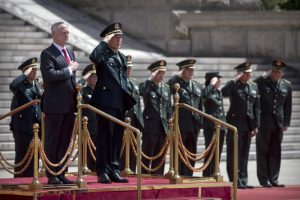
By Phil Stewart and Ben Blanchard
BEIJING (Reuters) – China is committed to peace and won’t cause “chaos” in the world, but cannot give up even an inch of territory that the country’s ancestors have left behind, Chinese President Xi Jinping told U.S. Defense Secretary Jim Mattis on Wednesday.
Mattis, a former Marine general, has been highly critical of China’s muscular military moves in the disputed South China Sea. The U.S. military even withdrew an invitation to China to join a multinational naval exercise that will start during Mattis’ visit, upsetting Beijing.
Mattis is visiting against a backdrop of spiraling tension between Beijing and Washington over trade.
Beijing is also deeply suspicious of U.S. intentions toward self-governing and democratic Taiwan, which is armed by the United States. China views the island as a sacred part of its territory.
Meeting in Beijing’s Great Hall of the People, Xi told Mattis that China had only peaceful intentions and would not “cause chaos,” state television reported.
Both countries’ common interests far outweigh their differences, but on territorial issues there can be no concessions, Xi added, without referring to specific areas.
“We cannot lose even one inch of the territory left behind by our ancestors. What is other people’s, we do not want at all,” state television cited Xi as saying.
Mattis, in comments in front of reporters, told Xi his talks had been “very, very” good.
“I am happy to be in China and we are assigning the same high degree of importance to the military relationship,” Mattis said.
Meeting earlier in the day, China’s defense minister told Mattis that only with mutual respect and by avoiding confrontation can China and the United States develop together.
“China upholds peaceful development, and China’s military unswervingly protects the country’s sovereignty, security and development interests,” Chinese Defence Minister Wei Fenghe said, according to his ministry.

U.S. Defense Secretary Jim Mattis, left, and China’s Defense Minister Wei Fenghe stand as the American national anthem is played during a welcome ceremony at the Bayi Building in Beijing, Wednesday, June 27, 2018. Mark Schiefelbein/Pool via Reuters
“China and the United States can only develop together if we maintain no conflict, no confrontation, mutual respect and win-win cooperation,” Wei added.
“China and the United States’ two militaries must implement the consensus of the two countries’ leaders, increase mutual trust, strengthen cooperation and manage risks to turn ties between the two militaries into a factor for stability in the bilateral relationship.”
Mattis, the first Pentagon chief to visit China since 2014, told Wei he expected all of his conversations in Beijing would be characterized by an “open and honest” dialogue, like the one he had with Wei.
“The military-to-military relationship is critical to the broader relationship between our two countries,” Mattis added, in comments also in front of reporters.
Mattis invited Wei to visit him at the Pentagon.
Wei was similarly upbeat in his public remarks.
“Your visit to China this time is … a new positive factor to the military-to-military and state-to-state relationship,” said Wei, who only assumed his position in March.
TAIWAN TENSION
The Chinese defense ministry statement made only passing mention of the South China Sea, Taiwan and North Korea, citing Wei as telling Mattis what China’s positions were on those issues.
As Mattis arrived, Chinese state media said a formation of Chinese warships had been holding daily combat drills for more than a week in waters near Taiwan, and there have been frequent Chinese air force exercises near the island.
While China and the United States have tried hard to keep lines of communication between their militaries open, especially at the senior level, they are deeply suspicious of each other.
The United States accuses China of militarizing the South China Sea with its island-building work there, while China has been angered by U.S. naval patrols through the strategic waterway.
In May, the United States withdrew an invitation to China to attend a major U.S.-hosted naval drill, the Rim of the Pacific exercise, known as RIMPAC and previously attended by China, in response to what Washington sees as Beijing’s militarization of the South China Sea.
Still, the two have broad strategic common interests, such as ensuring peace and stability on the Korean peninsula.
China welcomed a historic summit between U.S. President Donald Trump and North Korean leader Kim Jong Un earlier this month in Singapore, where Kim reaffirmed a commitment to work toward complete denuclearisation of the Korean peninsula, while Trump said he would halt joint U.S.-South Korean “war games.”
(The story is refiled to removes extraneous words paragraphs five and nine, fixes typo paragraph seven.)
(Reporting by Phil Stewart and Ben Blanchard; Additional reporting by Christian Shepherd and Michael Martina; Editing by Michael Perry, Robert Birsel)










